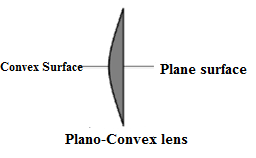Question
Question: A thin Plano-convex lens acts like a concave mirror of focal length \[0.2{\text{ }}m\]when silvered ...
A thin Plano-convex lens acts like a concave mirror of focal length 0.2 mwhen silvered at its plane surface. The Refractive index of the material of the lens is 1.5. The radius of curvature of the convex surface of the lens is:
A. 0.1 m
B. 0.2 m
C. 0.4 m
D. 0.8 m
Solution
In a Plano-convex lens, the convex surface is curved outwards and the other surface is flat. The focal length of a Plano-convex lens can be estimated using the lens maker formula. The focal length of a plane or flat surface is equal to infinity.
Formula used:
Lens maker formula is given by
f1=(μ−1)(R11−R21)
Complete step by step solution:
Plano-convex lens is a kind of lens that is plane on one side and the other. Plano-convex lenses have one positive convex face and also a flat or else plane face on the opposite side of the lens. These lens elements will focus parallel light rays into a focal point that is positive and can form a real image which will be projected on a screen or handled by spatial filters.
Here we take a thin plano-convex lens which behaves like a concave mirror of focal length 0.2m when it is severed from its plane surface, Focal length of the Plano-convex lens is f=0.2m=20cm. Refractive index of the material of the lens which acts as a concave mirror is μ=1.5.
From the combinational lens formula, we can get,

f11=f2+fm1
Where,
f1 is the focal length of combination, which is, Plano-convex lens
f is the focal length of the convex surface of the lens
fm is the focal length of the mirror surface
We have,
fm=∞,
because the focal length of any plane surface is said to be infinite
f11=f2+fm1
Putting values of f1andfm we get
f11=f2
f=2f1
f=2×20=40cm
From lens maker formula,
f1=(μ−1)(R11−R21)
We get,
f=40cm
μ=1.5
R2=∞
401=(1.5−1)(R11−∞1)
⇒401=2R11
R1=20cm
The radius of curvature of the convex surface of the lens is said to be 20cm
Hence, the answer is Option D.
Note:
A Plano-convex lens is a group of two different types of surfaces, one is flat and the other one is curved outwards. The focal length of a plane surface is always equal to infinity. It can be taken as a spherical surface of an infinite radius of curvature. As the radius of curvature of the plane surface is infinity, so its focal length will also be infinity. The focal length of a plano convex lens is estimated with the help of a lens maker formula.
